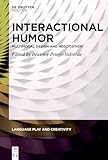Interactional Humor : Multimodal Design and Negotiation / ed. by Béatrice Priego-Valverde.
Material type: TextSeries: Language Play and Creativity [LPC] ; 10Publisher: Berlin ; Boston : De Gruyter Mouton, [2023]Copyright date: ©2024Description: 1 online resource (VI, 356 p.)Content type:
TextSeries: Language Play and Creativity [LPC] ; 10Publisher: Berlin ; Boston : De Gruyter Mouton, [2023]Copyright date: ©2024Description: 1 online resource (VI, 356 p.)Content type: - 9783110996333
- 9783110983289
- 9783110983128
- 808.7
- P304 .I58 2024 ebook
- online - DeGruyter
- Issued also in print.
| Item type | Current library | Call number | URL | Status | Notes | Barcode | |
|---|---|---|---|---|---|---|---|
 eBook
eBook
|
Biblioteca "Angelicum" Pont. Univ. S.Tommaso d'Aquino Nuvola online | online - DeGruyter (Browse shelf(Opens below)) | Online access | Not for loan (Accesso limitato) | Accesso per gli utenti autorizzati / Access for authorized users | (dgr)9783110983128 |
Frontmatter -- Contents -- Introduction -- Part 1: Face-to-face interactions -- 1 A multimodal approach to children’s development of humor in family life -- 2 On target. On the role of eye-gaze during teases in face-to-face multiparty interaction -- 3 Humorous Smiling: A Reverse Cross-Validation of the Smiling Intensity Scale for the Identification of Conversational Humor -- 4 Alternative conceptualizations of the Smiling Intensity Scale (SIS) and their applications to the identification of humor -- 5 Facial gestures and laughter as a resource for negotiating humor in conversation -- 6 Multimodal humor in human-robot interaction -- Part 2: Mediated interactions -- 7 Facial expressions as multimodal markers of humor: More evidence from scripted and non-scripted interactions -- 8 Emojis and jocular flattery in Chinese instant messaging interactions -- 9 More than laughter: Multimodal humour and the negotiation of ingroup identities in mobile instant messaging interactions -- 10 Humour and creativity in a family of strangers on Facebook -- 11 “Loanword translation and corrective acts are incongruous”: Debating metapragmatic stereotypes through humorous memes -- Index
restricted access online access with authorization star
http://purl.org/coar/access_right/c_16ec
The central question explored in this volume is: How is humor multimodally produced, perceived, responded to, and negotiated? To this end, it offers a panorama of linguistic research on multimodal and interactional humor, based on different theoretical frameworks, corpora, and methodologies. Humor is considered as an activity that is interactionally achieved, regardless of whether the interaction in which it is embedded is face-to-face, computer-mediated, with a human or a robot, oral or written. The aim is to analyze both the linguistic resources of the participants (such as their lexicon, prosody, gestures, gazes, or smiles) and the semiotic resources that social networks and instant messaging platforms offer them (such as memes, gifs, or emojis).
Issued also in print.
Mode of access: Internet via World Wide Web.
In English.
Description based on online resource; title from PDF title page (publisher's Web site, viewed 25. Jun 2024)


